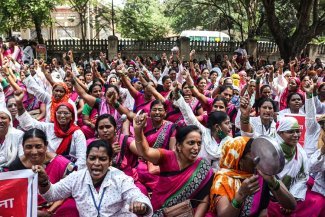
There are better places in the world to be a woman than Turkey.
Five women are killed every day simply because they are women while 42 per cent of Turkish women report having experienced physical or sexual violence. In addition, the number of women murdered between 2002 and 2009 went up by an astonishing 1400 per cent.
According to Turkish human rights activists, these numbers are just the tip of the iceberg.
While on the one hand the country has taken important steps to increase its international reputation on women’s rights by becoming the first signatory to the Council of Europe Convention Against Domestic Violence Against Women, the reality paints a different picture.
Almost daily, newspapers headline stories of women being murdered, usually violently, in a manner which involves knives or guns.
Most often, the women are victims of so-called ‘honour killings’ committed by an estranged husband or family member.
In one horrific case last year, a 20-year-old mother and her baby were strangled. The perpetrators? Her brother and father.
Liz Amado, of Turkish NGO Women for Women’s Human Rights explains: “It’s true that on the one hand we now have much better reporting and documentation of violence against women.
"On the other hand, we do see a significant increase in violence against women, which can in part be attributed to the culture of violence that is promoted in political and social spheres all over the world.
"Added stresses such as rising social-political tensions, the financial crisis and poverty are also reflected in this increase in violence against women.”
KESK
But the situation in Turkey is even worse for those women that dare to speak out and demand social and gender equality.
For these women, the road leads straight to prison via vague charges, prolonged pre-trial incarceration and severe punishments. Some activists are even facing up to 45 years in jail.
In February, 15 female members of KESK – Turkey’s independent trade union confederation – were taken into custody for “illegal activities”, bringing the total number of KESK members arrested this year to 75.
Their offenses have included joining and organising demonstrations, strike actions and “crimes of propaganda” which included calling a TV channel and writing an article for a Kurdish TV channel.
The first hearing of the trial against the 15 women of KESK arrested in February took place on 4 October where six of the detained women were released pending trial and three were sent back to the prison. The second hearing takes place next week on 13 December.
On closer inspection, the complexity of the problems that swirl around the KESK arrests becomes clear: KESK has a strong Kurdish member base – the country’s largest ethnic minority that constitutes a fifth of Turkey’s population and with which the Turkish government struggles to maintain peaceful ties, even after its 2009 pledge to launch a “democratic opening” to address the Kurdish problem in Turkey and respect the rights of all minority groups in its society.
Apart from the ethnic tensions which cloud the drive for gender equality, serious questions also remain over the commitment of the Islamic-rooted government to gender equality.
While Turkey has full equality on paper and proudly announces that it “has introduced the most progressive legal reforms in Europe to improve women’s rights at home, in school, in the workplace”, the reality remains discouragingly bleak.
“Ambivalent at best”
In the 2011 Global Gender Gap Report Turkey ranks 122 out of 135 countries.
A gender-gap in education remains, the country has the lowest levels of female employment among OECD countries and the representation of women in decision-making bodies is also low.
According to recent research, 39 per cent of the women in Turkey are victims of physical violence and 15 per cent are victims of sexual violence.
Yet a country despite such high levels of inter-gender violence and a 1400 per cent increase in the number of femicides, Turkey only has 26 shelters for 72 provinces.
“The government’s approach to gender equality is ambivalent at best,” adds Amado. We clearly need stronger political will to improve the situation for women.
"Prime Minister Recep Tayyip Erdoğan’s announcement that the ‘Ministry for Women and Family’ will be replaced by a ‘Ministry of Family and Social Policies’, and his conservative stance earlier this year on abortion, reflect that ambivalence.
"And while the legal framework for gender equality has improved over the past decade, implementation remains problematic.”
But for many activists, including Amado’s Women for Women’s Human Rights and the KESK women, a hostile political environment and the threat of imprisonment are no reason to keep silent in the face of injustice.
And while only eight per cent of Turkish women who experienced violence dared to request help from official bodies, Amado and other Turkish human rights activists continue to raise their voice for freedom of expression and other social rights in Turkey.








